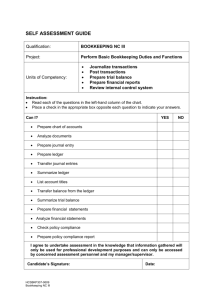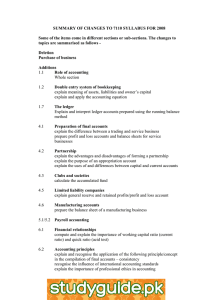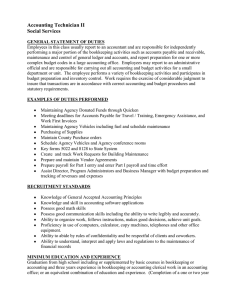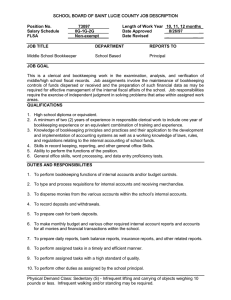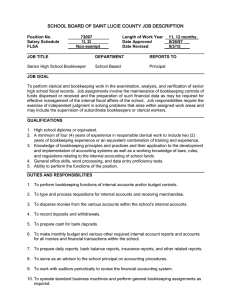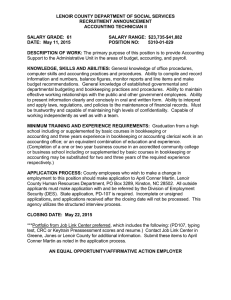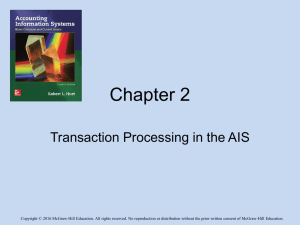THE MOST IMPORTANT 5 CENTS PURCHASE YOU CAN MAKE
advertisement
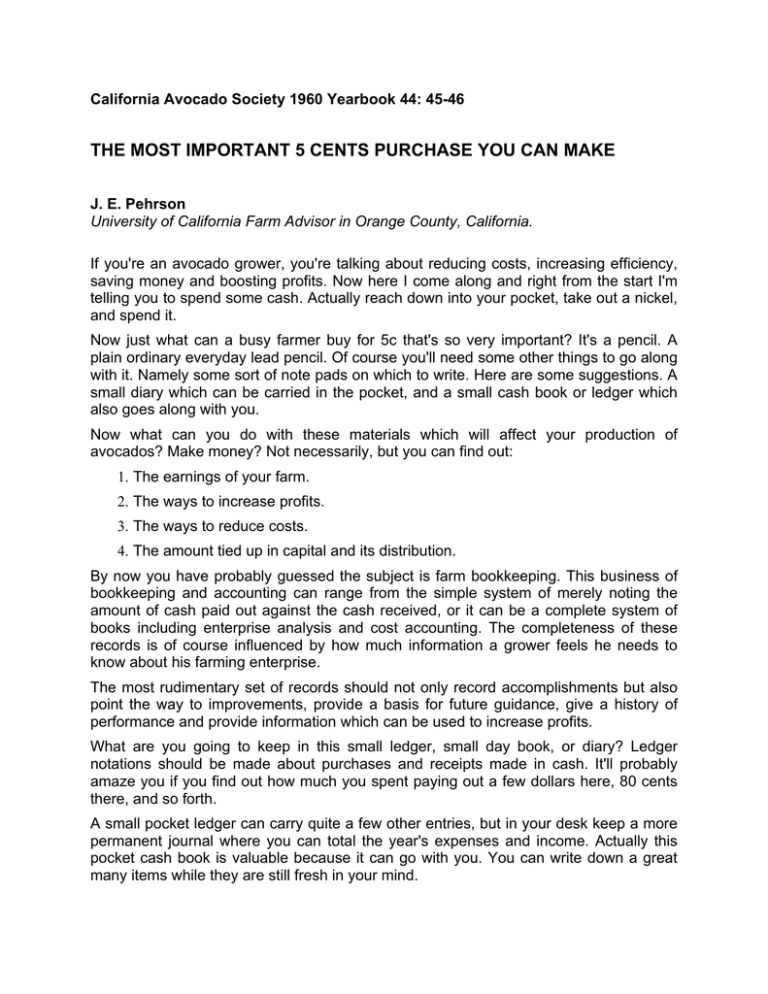
California Avocado Society 1960 Yearbook 44: 45-46 THE MOST IMPORTANT 5 CENTS PURCHASE YOU CAN MAKE J. E. Pehrson University of California Farm Advisor in Orange County, California. If you're an avocado grower, you're talking about reducing costs, increasing efficiency, saving money and boosting profits. Now here I come along and right from the start I'm telling you to spend some cash. Actually reach down into your pocket, take out a nickel, and spend it. Now just what can a busy farmer buy for 5c that's so very important? It's a pencil. A plain ordinary everyday lead pencil. Of course you'll need some other things to go along with it. Namely some sort of note pads on which to write. Here are some suggestions. A small diary which can be carried in the pocket, and a small cash book or ledger which also goes along with you. Now what can you do with these materials which will affect your production of avocados? Make money? Not necessarily, but you can find out: 1. The earnings of your farm. 2. The ways to increase profits. 3. The ways to reduce costs. 4. The amount tied up in capital and its distribution. By now you have probably guessed the subject is farm bookkeeping. This business of bookkeeping and accounting can range from the simple system of merely noting the amount of cash paid out against the cash received, or it can be a complete system of books including enterprise analysis and cost accounting. The completeness of these records is of course influenced by how much information a grower feels he needs to know about his farming enterprise. The most rudimentary set of records should not only record accomplishments but also point the way to improvements, provide a basis for future guidance, give a history of performance and provide information which can be used to increase profits. What are you going to keep in this small ledger, small day book, or diary? Ledger notations should be made about purchases and receipts made in cash. It'll probably amaze you if you find out how much you spent paying out a few dollars here, 80 cents there, and so forth. A small pocket ledger can carry quite a few other entries, but in your desk keep a more permanent journal where you can total the year's expenses and income. Actually this pocket cash book is valuable because it can go with you. You can write down a great many items while they are still fresh in your mind. A day book or diary is where information such as a number of hours spent doing cultural practices are noted. Also the number of inches used in an irrigation, temperature records or rainfall. In the spring time observations as to the dates of heavy bloom. Also when a heavy drop occurs, or when the fruit is testing. Things like crop estimating can be noted in this little diary. Incidentally, proper practice of bookkeeping helps develop a habit of thrift, builds a knowledge of business procedure, stresses the value of saving, encourages farming for its money making potentialities, establishes confidence, and creates a feeling of independence. As indicated, farm bookkeeping is not a direct way of making money, but rather a means of showing where the money goes, to point out where profits are being made and where leaks occur. What are some of the essentials of good bookkeeping as they apply to avocados? First of course is the item of accuracy. Entries must be made properly and be sure that calculations are correct. Second of course is completeness, write down things like date, item, and cost. This is needed to insure accuracy and to provide sufficient detail so that the record will be of value in the future. Of course these records will need to be permanent. Not kept on scraps of paper which can be easily lost. They should be neat so that it's a pleasure to handle them, and not a tiresome chore. Entries should be legible. The misplacement of a decimal point can mean the difference between $10.00 or $100.00. Simplicity of arrangement in the bookkeeping system for annual summaries is largely up to the individual because he alone is in a position to determine what he actually desires to obtain from his record keeping. This is why the original suggestion has been made that to start out a simple bookkeeping system you need a pencil, a little diary, or some type book for writing down cash transactions such as a pocket ledger. In addition to the paper work there are a few items of record keeping which are essentially peculiar to the avocado grower. I am referring to grove mapping and tree bookkeeping. Since a single tree is the unit of production it is convenient to mark its producing capacity. A grower can build up a great deal of information about his orchard if he has some way of noting the production of individual trees. Many growers use some sort of tag placed on each tree. Preferably of metal. This tag can be a 3-inch square of galvanized sheet. It is merely tacked onto the trunk, the metal surface is rough so that an ordinary lead pencil leaves a pretty good mark. All sorts of notations can be kept on these tags, including tree variety, planting date, fertilizer application as well as yield. The crop yield can be either marked down as an estimate or the actual time of picking the field boxes can be noted to the nearest one-tenth of a box. When this information is combined with the total tree count an accurate picture of the orchard as a producing unit is down in black and white. Few growers will probably ever become so interested in bookkeeping that they become accountants, but all can learn more about their avocado enterprises by jotting down bits of information and compiling and comparing notes. All that's needed is (1) a good pencil (2) a little day book (3) a little pocket ledger.
